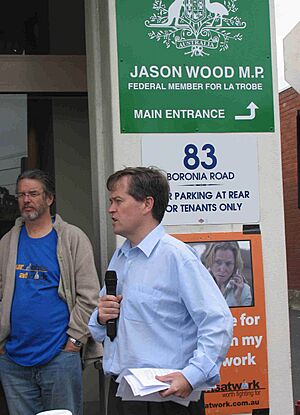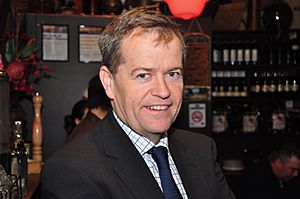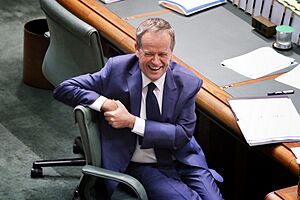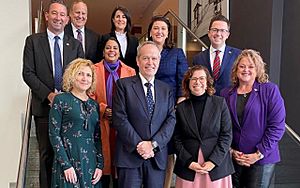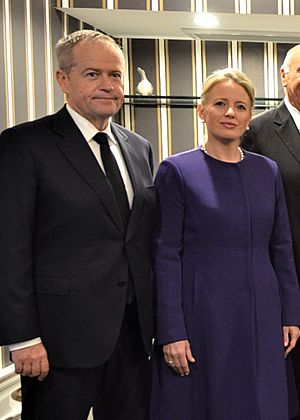Bill Shorten facts for kids
Quick facts for kids
Bill Shorten
|
|||||||||||||||||||||||||||||||||||||||||||||||||||||||||||||||||||||||||||
|---|---|---|---|---|---|---|---|---|---|---|---|---|---|---|---|---|---|---|---|---|---|---|---|---|---|---|---|---|---|---|---|---|---|---|---|---|---|---|---|---|---|---|---|---|---|---|---|---|---|---|---|---|---|---|---|---|---|---|---|---|---|---|---|---|---|---|---|---|---|---|---|---|---|---|---|
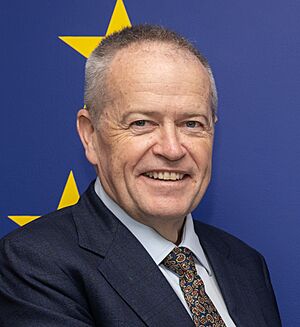
Shorten in 2024
|
|||||||||||||||||||||||||||||||||||||||||||||||||||||||||||||||||||||||||||
| Vice-Chancellor of the University of Canberra | |||||||||||||||||||||||||||||||||||||||||||||||||||||||||||||||||||||||||||
| Assumed office 14 February 2025 |
|||||||||||||||||||||||||||||||||||||||||||||||||||||||||||||||||||||||||||
| Preceded by | Stephen Parker | ||||||||||||||||||||||||||||||||||||||||||||||||||||||||||||||||||||||||||
| Leader of the Opposition | |||||||||||||||||||||||||||||||||||||||||||||||||||||||||||||||||||||||||||
| In office 13 October 2013 – 30 May 2019 |
|||||||||||||||||||||||||||||||||||||||||||||||||||||||||||||||||||||||||||
| Prime Minister | |||||||||||||||||||||||||||||||||||||||||||||||||||||||||||||||||||||||||||
| Deputy | Tanya Plibersek | ||||||||||||||||||||||||||||||||||||||||||||||||||||||||||||||||||||||||||
| Preceded by | Chris Bowen (Interim) | ||||||||||||||||||||||||||||||||||||||||||||||||||||||||||||||||||||||||||
| Succeeded by | Anthony Albanese | ||||||||||||||||||||||||||||||||||||||||||||||||||||||||||||||||||||||||||
| 20th Leader of the Labor Party | |||||||||||||||||||||||||||||||||||||||||||||||||||||||||||||||||||||||||||
| In office 13 October 2013 – 30 May 2019 |
|||||||||||||||||||||||||||||||||||||||||||||||||||||||||||||||||||||||||||
| Deputy | Tanya Plibersek | ||||||||||||||||||||||||||||||||||||||||||||||||||||||||||||||||||||||||||
| Preceded by | Kevin Rudd | ||||||||||||||||||||||||||||||||||||||||||||||||||||||||||||||||||||||||||
| Succeeded by | Anthony Albanese | ||||||||||||||||||||||||||||||||||||||||||||||||||||||||||||||||||||||||||
|
|||||||||||||||||||||||||||||||||||||||||||||||||||||||||||||||||||||||||||
| Member of the Australian Parliament for Maribyrnong |
|||||||||||||||||||||||||||||||||||||||||||||||||||||||||||||||||||||||||||
| In office 24 November 2007 – 20 January 2025 |
|||||||||||||||||||||||||||||||||||||||||||||||||||||||||||||||||||||||||||
| Preceded by | Bob Sercombe | ||||||||||||||||||||||||||||||||||||||||||||||||||||||||||||||||||||||||||
| Succeeded by | Jo Briskey | ||||||||||||||||||||||||||||||||||||||||||||||||||||||||||||||||||||||||||
| Personal details | |||||||||||||||||||||||||||||||||||||||||||||||||||||||||||||||||||||||||||
| Born | 12 May 1967 Fitzroy, Victoria, Australia |
||||||||||||||||||||||||||||||||||||||||||||||||||||||||||||||||||||||||||
| Political party | Labor | ||||||||||||||||||||||||||||||||||||||||||||||||||||||||||||||||||||||||||
| Spouses |
Debbie Beale
(m. 2000; div. 2008)Chloe Bryce
(m. 2009) |
||||||||||||||||||||||||||||||||||||||||||||||||||||||||||||||||||||||||||
| Children | 1 | ||||||||||||||||||||||||||||||||||||||||||||||||||||||||||||||||||||||||||
| Relatives |
|
||||||||||||||||||||||||||||||||||||||||||||||||||||||||||||||||||||||||||
| Education |
|
||||||||||||||||||||||||||||||||||||||||||||||||||||||||||||||||||||||||||
| Occupation | Politician | ||||||||||||||||||||||||||||||||||||||||||||||||||||||||||||||||||||||||||
| Profession | Trade unionist | ||||||||||||||||||||||||||||||||||||||||||||||||||||||||||||||||||||||||||
| Signature |  |
||||||||||||||||||||||||||||||||||||||||||||||||||||||||||||||||||||||||||
| Military service | |||||||||||||||||||||||||||||||||||||||||||||||||||||||||||||||||||||||||||
| Allegiance | |||||||||||||||||||||||||||||||||||||||||||||||||||||||||||||||||||||||||||
| Branch/service | Australian Army Reserve | ||||||||||||||||||||||||||||||||||||||||||||||||||||||||||||||||||||||||||
| Years of service | 1985–1986 | ||||||||||||||||||||||||||||||||||||||||||||||||||||||||||||||||||||||||||
William Richard Shorten (born 12 May 1967) is an Australian who was a politician and a leader in trade unions. He was the leader of the Australian Labor Party (ALP) and the Leader of the Opposition from 2013 to 2019. He also served as a minister in the Australian government at different times.
Shorten was born in Melbourne. He studied law at Monash University. Before becoming a politician, he worked as a lawyer and then as an organiser for the Australian Workers' Union (AWU). He became the national secretary of the AWU in 2001. He became well-known across Australia for his role in helping during the Beaconsfield Mine collapse in 2006.
He was elected to the House of Representatives in 2007, representing the area of Maribyrnong. He became a government minister in 2010, holding roles like Assistant Treasurer and Minister for Education. He played a big part in creating the National Disability Insurance Scheme (NDIS).
After the Labor Party lost the 2013 election, Shorten became the leader of the Labor Party. He led the party in the 2016 and 2019 federal elections. After the 2019 election, he stepped down as leader. When Labor won the 2022 election, Shorten became a minister again, looking after the NDIS and Government Services.
Shorten left politics in January 2025. He is now the vice-chancellor of the University of Canberra, a role he started in February 2025.
Contents
Early Life and Education
Birth and Family
Bill Shorten was born on 12 May 1967 in Melbourne. He has a twin brother named Robert. His mother was a university academic and a lawyer. She studied at Monash University and later worked as a barrister. His father was a marine engineer from England. He worked in Melbourne and often met with union leaders.
Growing Up
Shorten grew up in Hughesdale, a suburb of Melbourne. He went to St Mary's Catholic Primary School. He later attended Xavier College, a high school in Kew. During his school years, he was good at debating and was chosen for the state debating team. He also enjoyed fencing and was a state champion in the sabre division when he was under 15.
University Studies
In 1985, Shorten started studying at Monash University. He also joined the Australian Army Reserve for a few years. At university, he was involved in student politics, especially with the Labor Party club. He helped create a group within Young Labor. After university, he worked as a lawyer for about twenty months.
Career in Trade Unions
Joining the AWU
In 1994, Bill Shorten began his career in trade unions. He joined the Australian Workers' Union (AWU) as a trainee organiser. He quickly moved up and was elected the Victorian state secretary of the AWU in 1998.
National Leadership
In 2001, Shorten was elected as the AWU's national secretary, a role he held until 2007. During this time, he was an important member of the Labor Party's national executive. He also served on the executive of the Australian Council of Trade Unions, which is a big group for workers' unions.
Beaconsfield Mine Rescue
In 2006, a mining accident happened at the Beaconsfield Mine collapse. As the national secretary of the AWU, Shorten played a key role. He helped negotiate and spoke to the media about the rescue efforts. This event brought him a lot of national attention and raised his public profile.
Political Journey
Entering Parliament
In 2007, Bill Shorten was elected to the House of Representatives. He became the Labor Member of Parliament (MP) for the area of Maribyrnong. After being elected, he was immediately appointed as a Parliamentary Secretary. In this role, he strongly supported the idea of a National Disability Insurance Scheme (NDIS).
Becoming a Minister
After the 2010 federal election, Shorten was promoted to a government minister. He served as the Assistant Treasurer and then as the Minister for Financial Services and Superannuation. He also became the Minister for Workplace Relations. In 2013, he briefly served as the Minister for Education.
Leading the Labor Party
After the Labor government lost the 2013 election, the then-leader, Kevin Rudd, stepped down. Bill Shorten decided to run for the leadership of the Labor Party. He won the election against Anthony Albanese in October 2013. This made him the new leader of the Labor Party and the Leader of the Opposition.
As Opposition Leader
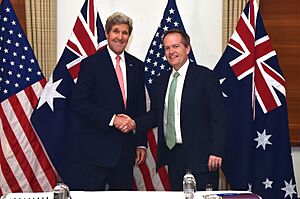
As Opposition Leader, Shorten often spoke about important issues. In 2015, he called for Australia to become a republic, meaning it would have an Australian head of state instead of the British monarch. He also supported lowering the voting age to 16.
In the 2016 federal election, Shorten led the Labor Party to gain 14 seats. The result was very close, with the Liberal-National Coalition winning by just one seat.
In the 2019 federal election, most polls predicted Labor would win. However, the Coalition, led by Scott Morrison, won the election by surprise. After this defeat, Shorten announced he would step down as Labor leader. Anthony Albanese then became the new leader.
After Leadership
After stepping down as leader, Shorten remained an important member of the Labor Party. When Labor won the 2022 federal election, Shorten was appointed as the Minister for the National Disability Insurance Scheme (NDIS) and Minister for Government Services.
As Minister, he worked to improve the NDIS and stop fraud within the scheme. He also led the government's response to an inquiry into a past government scheme called Robodebt, which had caused problems for many people.
On 5 September 2024, Shorten announced he would leave politics. He also shared that he would become the Vice-Chancellor of the University of Canberra. He officially resigned from Parliament on 20 January 2025.
Post-Political Career
Bill Shorten became the Vice-Chancellor of the University of Canberra on 14 February 2025. This role involves leading the university.
Personal Life
In 2000, Bill Shorten married Debbie Beale. They later divorced in 2008. In 2009, he married Chloe Bryce. Chloe is the daughter of Quentin Bryce, who was the Governor-General of Australia. The Shortens live in Moonee Ponds, Victoria, with their daughter and Chloe's two other children from a previous marriage.
Shorten was raised Catholic but became an Anglican before his second marriage.
See also
 In Spanish: Bill Shorten para niños
In Spanish: Bill Shorten para niños
- Shadow Ministry of Bill Shorten
 | Bayard Rustin |
 | Jeannette Carter |
 | Jeremiah A. Brown |


